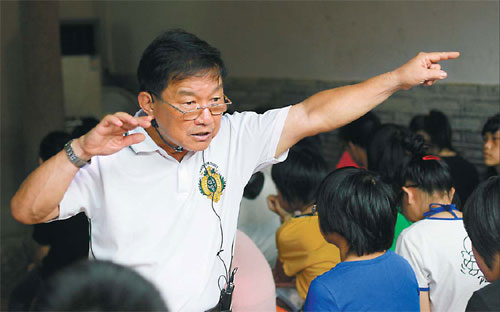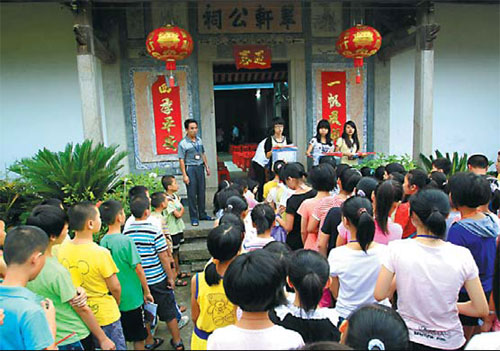Now
I
know
my
A-B-C
By
Xu
Jingxi (
China
Daily)

David Liao teaches students at the
English tuition center, which was formerly his grandfather's ancestral
hall.
Photos by Zou Zhongpin / China Daily

Liao's
reputation
has
spread
quickly
and
students
of
surrounding
villages
are
keen
to
attend
his
classes.
My
China
Dream |
David
Liao
There
is
a
rural
village
in
Guangdong
where
even
a 4-year-old
can
fluently
respond
to
an
English
greeting.
And
as
Xu
Jingxi
discovers,
it's
all
thanks
to
the
efforts
of
a
retired
Chinese-Malaysian.
When
David
Liao
turned
up
in
Changjiao
village 10
years
ago
and
announced
that
he
would
teach
the
children
how
to
speak
English
for
free,
the
villagers
in
this
tiny
hamlet
in
Meizhou,
Guangdong
province,
all
thought
he
was
just
a "mad
foreigner".
Liao,
now 67,
spoke
only
English
and
a
smattering
of
Mandarin,
and
the
people
in
this
mountain
community
were
puzzled
by
his
attention,
and
intentions.
"We
couldn't
figure
out
why
he
chose
to
come
to
our
remote
village
to
teach
English.
And
as
a
man
who
was
almost 60
at
that
time,
he
was
still
single.
How
strange!"
villager
Chen
Cuixiang
recalls.
But
Liao
was
no
stranger,
as
they
thought.
"I
was
born
in
Malaysia
but
Changjiao
village
is
my
ancestral
home.
I
decided
to
come
back
to
help
the
village
after
I
retired
as
an
English
teacher
and
a
high
school
principal
in
Malaysia,"
he
explains.
He
had
visited
Changjiao
village
twice
before,
in 1996
and 2001.
"The
village
was
an
abandoned,
dying
village,
with
only
old
people
doing
a
little
farming
work.
The
young
people
were
all
going
to
the
cities
to
earn
money.
There
were
only
mud
and
gravel
roads,"
Liao's
first
impressions
of
his
ancestral
village
were
dismal.
Related:
Act
to
inspire
"The
village
head
complained
that
it
was
difficult
to
find
an
affordable
English
teacher
who
would
agree
to
come
to
the
mountain
village
to
work,"
Liao
recalls.
He
thought
about
it
and
decided
to
volunteer
for
the
job.
It
was
not
easy-going,
and
Liao
found
his
intentions
questioned.
Villagers
were
suspicious
and
students
played
tricks
on
him -
puncturing
his
bicycle
tires
and
stealing
his
laptop.
Instead
of
getting
discouraged,
Liao
decided
to
work
at
it,
studying
the
local
Hakka
dialect
so
he
could
communicate
better.
After
classes,
he
would
ride
to
tutor
two
private
students,
one-on-one.
He
had
one
student
in
the
village
and
the
other
in
Dabu
county
about 7
km
away.
"No
matter
what
you
do,
there
is
always
someone
who
supports
you,
someone
who
is
against
you
and
another
who
would
wait
and
see.
I
must
do
it
well
even
if
there
is
only
one
in
a
hundred
who
supports
me,"
Liao
says.
It
was
this
commitment
that
started
to
change
the
general
perception.
Liao
Luhong
was
one
of
Liao's
first
private
students.
The 21-year-old
college
student
was
in
his
fourth
year
of
primary
school
when
his
grandfather
invited
David
Liao
to
be
his
English
tutor,
during
the
summer
holidays.
The
little
boy
could
not
even
recite
his
alphabet
then.
"My
grandson
got
transferred
to
a
primary
school
in
Shenzhen.
He
scored
only 30
points
in
his
first
English
test.
It
was
not
surprising
because
kids
in
our
village
are
not
taught
English
until
they
are
in
the
fifth
grade,"
says
his
grandfather
Liao
Xuming.
The
mad
foreigner's
tuition
proved
to
be
very
effective.
In
his
fifth
year,
Liao
Luhong
came
out
top
of
his
English
class
and
two
years
ago,
he
was
admitted
to
college,
helped
by
his
high
scores
in
English.
"My
spoken
English
is
better
than
many
of
my
college
mates,
although
many
of
them
are
from
big
cities,"
says
Liao
Luhong.
David
Liao's
teaching
skills
have
quickly
spread
by
word
of
mouth,
and
more
and
more
people
from
the
surrounding
country
and
cities
heard
of
this
experienced
teacher
with
nearly 45
years
of
English
teaching
under
his
belt.
Related:
Migrant
children
have
greater
chance
of
missing
out
on
school
The
media
has
also
helped
spread
his
reputation
to
as
far
away
as
Guangzhou,
Shenzhen
and
Huizhou.
There
are
now
many
parents
eager
to
send
their
children
to
his
classes
during
weekends
and
school
holidays.
In
their
eyes,
Liao's
classes
offer
their
children
a
chance
at
a
better
future.
"Because
of
the
lack
of
qualified
English
teachers,
kids
in
rural
areas
lag
far
behind
their
peers
in
urban
areas
in
terms
of
English
proficiency.
It
is
often
the
subject
where
the
biggest
gap
in
scores
lies,"
Liao
says.
Since
Liao
started
teaching
English
in
Changjiao,
more
than 20
young
people
from
the
village
have
gained
admission
to
college.
Before
that,
there
were
very
few.
Liao
also
sponsored
those
college
students
who
had
difficulty
paying
tuition,
and
the
subsidies
ranged
from 3,000
yuan ($472)
to 10,000
yuan
per
year
per
student.
But
he
has
also
been
plagued
by
the
principles
of
diminishing
returns.
There
are
now
too
many
students
for
him
to
handle.
"I
never
thought
of
gaining
fame
with
teaching.
Some
parents
also
think
I
can
improve
their
children's
English
with
just
a
weekend
course,
or
a
week
of
lessons.
"Also,
I
believe
in
quality
education.
The
number
of
students
in
a
class
shouldn't
be
too
big,"
Liao
adds. "I
want
to
invest
my
limited
energy
and
resources
on
students
who
really
need
my
help
and
are
eager
for
that
help."
For
that
reason,
he
has
no
hesitation
kicking
out
students
who
are
disinterested
or
inattentive,
even
if
the
child
is
the
son
of
an
important
official.
He
interviews
each
prospective
student
and
only
accepts
those
who
are
genuinely
interested,
and
not
just
forced
by
their
parents
to
attend
classes.
Liao
has
had
to
expand
his
physical
classroom,
turning
a
dilapidated
ancestral
hall
built
by
his
grandfather
into
an
English
tuition
center
that
can
accommodate
about 200
students.
But,
there
is
hardly
room
for
proper
desks,
and
students
have
to
perch
on
plastic
stools.
A
projector
and
a
set
of
acoustic
equipment
ensures
students
can
hear
and
see
the
teaching
materials
Liao
uses.
Bookcases
line
the
hall,
and
are
filled
with
original
English
editions.
Rooms
in
the
wings
have
been
turned
into
dormitories
for
students
living
far
away
and
the
dozens
of
volunteers
who
help
with
summer
and
winter
courses.
Liao
paid
for
all
the
renovations
and
maintenance
costs
of
running
the
English
center
and
his
generosity
sounded "unbelievable"
to
many.
Liao
Huiru,
David
Liao's
former
assistant,
remembers
a
mother's
reaction
about
her
daughter
telling
her
she
was
going
to
take
free
English
lessons
in
a
mountainous
village.
"She
couldn't
believe
there
could
be
such
a
good
Samaritan
and
a
capable
English
teacher
in
a
village.
She
thought
her
daughter
was
falling
into
the
trap
of
a
pyramid
scheme
gang."
David
Liao
not
only
established
the
English
tuition
center,
he
also
funded
the
building
of
the
cement
road
leading
into
the
village,
set
up
street
lamps,
bought
nearly 10,000
pomelo
saplings
for
an
orchard
and
established
a
pig
farm
for
villagers.
Liao
explains
his
commitment.
"My
father
passed
away
when
I
was 13
years
old.
A
kind-hearted
principal
sponsored
my
education.
I
decided
that
I
would
also
help
people
in
need
when
I
grew
up.
My
father's
sudden
death
made
me
realize
life
could
be
fragile.
He
passed
away
in
his
sleep
without
any
warning,
right
beside
me
in
the
bed.
"I
should
live
every
day
to
the
full.
For
me,
it
means
devoting
myself
to
helping
people."
Liao
says
he
did
not
get
married
because
he
couldn't
have
done
his
charity
work
if
he
had
a
family
to
look
after.
"I
don't
feel
lonely.
I
have
more
children
and
grandchildren
than
any
one -
they
are
my
students,"
says
Liao,
who
has
been
giving
English
lessons
for
free
in
poor
communities
in
his
spare
time
since
he
started
teaching
in
Malaysia
in 1968.
He
says
he
is
able
to
continue
with
his
volunteer
efforts
thanks
to
many
of
his
previous
students
who
have
come
back
to
offer
their
support,
either
with
donations
or
other
helps.
It
is
this
spirit
of
giving
that
is
even
more
important
than
the
English
lessons,
he
says,
and
he
hopes
now
his
students
in
the
village
can
also
pay
it
forward.
In
fact,
his
efforts
have
shown
fruit -
Changjiao
village
is
now
known
as
the "English"
village
where
even
the
young
children
you
meet
on
the
streets
can
greet
visitors
with
a, "Good
morning"
and, "How
do
you
do",
in
English.
Villagers
who
used
to
quarrel
over
trivialities
have
been
moved
by
David
Liao's
generous
spirit,
and
they
have
learned
to
help
each
other.
"I
may
leave
the
village
five
years
later,"
says
Liao. "The
English
learning
center
doesn't
belong
to
me.
It
belongs
to
the
village
and
I'm
confident
that
they
will
maintain
it
with
the
farming
projects
I
helped
establish.
And
my
students
will
be
the
new
teachers."
Contact
the
writer
at
xujingxi@chinadaily.com.cn.
Now
I
know
my
A-B-C in PDF format |



